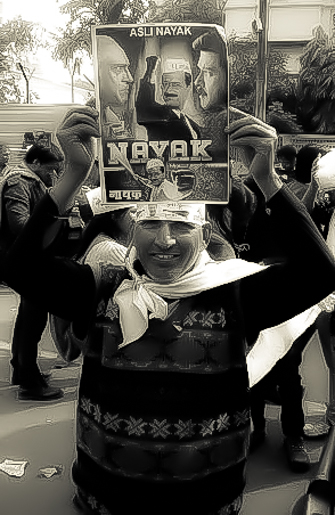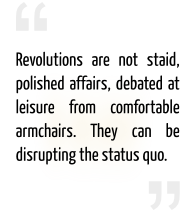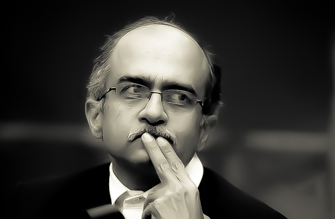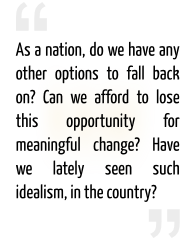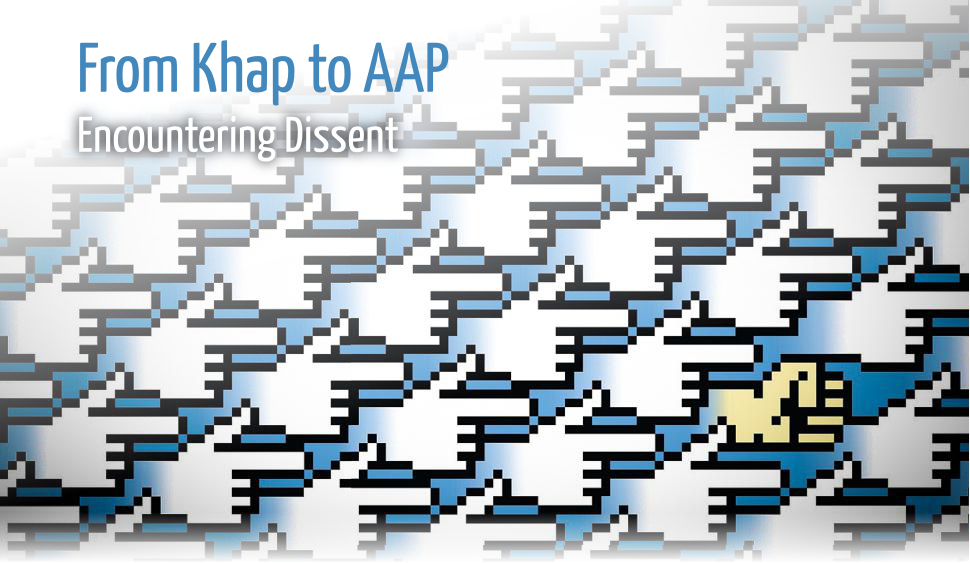
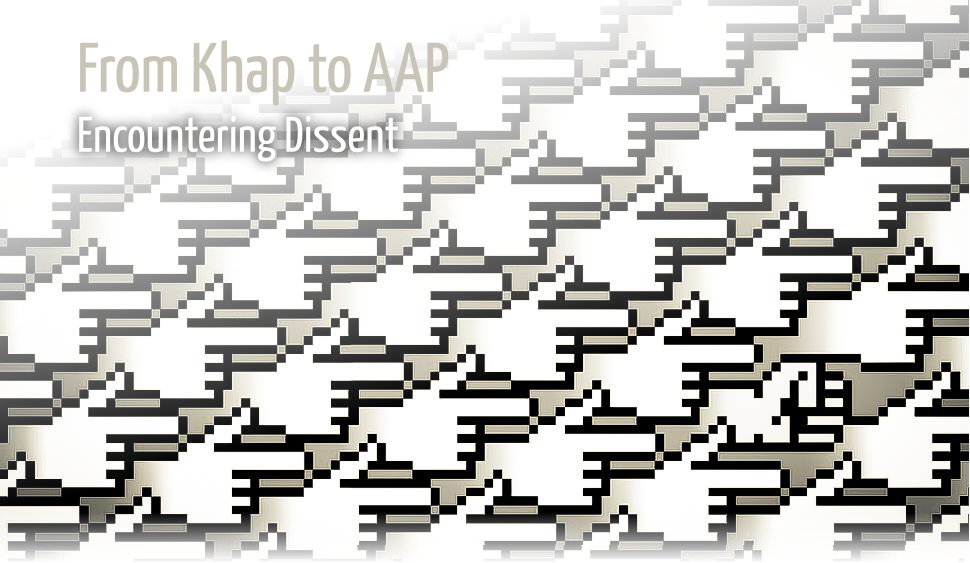
27 January 2014‘Let’s agree to disagree.’ Dissent: a differing voice. A modern democracy expects its citizens to respect the modalities of their disagreements. And these times do offer one the occasions to disagree with the majority. Should the disturbance caused by the dissenters be contained? Or should we rather cherish such agents, as they expand the borders of our rights and duties? The 65th Republic Day of India was marked by a strange upheaval at the heart of the ruling Aam Aadmi Party in Delhi, with ‘dissent’ becoming the new public mantra. This week, Raj Liberhan observes that the noise dynamics ruling the public sphere today prevents a genuine ethics of dissent from emerging. Lekha Roy argues how ‘ethics’ often turns out to be a luxury and a veil, for dissent may at times be repulsive, while being the only route to true change. |
Hold the cursor on the illustrations to display animations and descriptions.
Ethics of DissentRaj Liberhan |
Wanted: Dissent DesignerLekha Roy |
|
Indeed, the democratic art of negotiating solutions has been reduced to the jungle mode: ‘might is right’. Though asking questions is a sign of democracy, one has to admit that India today has become a cauldron of politically motivated questions. And the alternatives emerging from such a charged climate often turn out to be mere emotional reactions that allow no room for due diligence. ‘Throw the baby out with the bathwater’ tends to be the conclusion in such cases. These unfortunate developments are integrally linked to the information overflow that characterizes our times. Every conceivable space in the public domain is bursting at the seams. Literacy and awareness levels have risen exponentially, and there is a young population eager to play a role in the country’s prosperity. The advancements in the visual and digital media, and access to the internet have created a space for public discourse around every aspect of our lives. Nothing is personal, and no one has a life that is too private. In any case, everybody needs to be watched for the sake of security. We are citizens only secondarily; we are primarily potential suspects for potential mischief in a potential conflict zone of living.
No wonder, then – our public discourse is full of petty squabbles. Be it social mores, governance paradigms, the lawmakers in the legislative forum or a television studio, it is the one who shouts the most who gets the vote of approval. But that is only for a moment! Disaffection soon sets in and another squabble builds up, for, the loudest voice has no enduring rationale; it merely pleases a constituency and decries all opposition as anti-national, or at least, anti-rational.
Our neighbour relations are dictated by passion, too. When there is a border incident involving Pakistan, annihilation is talked of as the solution. A similar sentiment is displayed when the Sri Lankan force captures a fisherman entering their waters. At home, policy initiatives are attacked, as if every opening to the world market is like conceding the sovereignty of the country. Depth is no limit, for the discourse of invectives can sink to any level. True, there are sections of our society that express an anxious impatience about the collapse of transparent and ethical transactions in public policy and conduct. But that does not seem to change anything. There is hardly any long-term thinking, and thus, decisions lack sequencing. Our architects of governance do not articulate any original vision. We get our dreams by comparison: Mumbai will be made into Shanghai, Delhi will become a world-class city, and India will be a major world power. But we do not shape the instruments to reach these goals, and the rhetoric loses its ground to cynicism, despair and disgust, and the credibility of the state is gradually eroded.
Today, the ever-aspiring middle class wants ‘more and more’, ‘better and better’, ‘faster and instantly’! Impatience and intolerance have thus become the hallmark of our civic life. We get into ready personality-based confrontations with any system. We question not its performance, but its very existence. This leads to the pernicious promotion of particular persons as the embodiment of fairness and justice, and the argument that they can serve the needs of the society better than the impersonal rule of law. Are we, therefore, to infer that the law could now be challenged merely because someone can mobilize the community in a particular direction? The public domain is saturated with information, but also with misinformation. The social media are full of opinions, personal inconveniences and spiteful grouses. Motivated questions are circulated, online polls are arranged, likes and dislikes are acquired for a price. But no authentication! Surfer, you are on your own. It is your inclination, or your incredulity.   The saturation of (mis)information And what about the ‘silent class’? Those unheard voices, invisible and perplexed amidst the frivolous conversations not worthy of their time and not proximate enough for their attention? And what happens to the other voiceless, who, involved in the basics of living as they are, have no way to prevent their interests from getting appropriated or outsourced to caste or sectional leaderships? Somewhere, the idea of inclusive involvement, equally for obligations and rights, has been fractured and its dimensions are severely curtailed in national conversations. We have come to a point where nothing anymore is revered or held sacrosanct. The institutions of governance are suffering a credibility challenge, not to mention political and religious leaderships. The overwhelming community of challengers holds tight on its main strength: the ability to articulate the credibility check, not on any grounds of alternative logic, but solely because it is now possible to tarnish anything without verifiable evidence. Innuendoes, whispers, allegations and accusations are the arsenal of proponents and opponents.
In these vexing times, contrarianism has become a fashion label. It is liberally acquired by the newly arrived advocates of transparency, the assumed architects of public morality, but without following the ethics of dissent. The ethics of dissent helps one fight a viewpoint without having to castigate its holder. This ethics requires the contrarian to argue for an alternative logic and not merely destroy the logic of the proponent. It demands that a conflict of interest is stated at the outset, and not defended when discovered. It acknowledges mistakes and holds that public discourse must benefit the society at large, and not particular groups. It is an ethics that goes with the conviction that saying ‘sorry’ does not mean being consigned to history. Our discourses are replete with distortions of public interest and facilitation of personal agendas. Specious arguments run the gamut of public consciousness. Very recently, the AAP affair has highlighted the multi-layers of interest conflicts in the Indian arena of democratic debate. Innocent mistake of a newly appointed law minister, or unacceptable misconduct and abuse of power? Irreversible contempt for the state’s modus operandi, or procedural revolution for the good of the people? On both sides, the rhetorical battle is fierce and shots are blown mercilessly. Judicial conduct, political conduct, the government’s conduct, a film star’s conduct: in our times, everything is under the questioning gaze of the public intellectual who prophets as well as profits on multiple platforms. She argues for a code of conduct to suit the moment, but seems to be lacking in an essential: an ethics of dissent. |
When Gandhiji fasted in Calcutta for restoring peace between Hindus and Muslims, in August-September 1947, it was a party pooper amid the heady celebrations of Independence. And his was a cause not popular with his majority Hindu supporters. As we can see, convictions are not formed with popular mandate; on the contrary, it is often inconvenient for one’s constituency. As long as Jesus of Nazareth was performing miracles and feeding five thousand with five loaves, he was acceptable. But when he took on the entrenched clergy and their hypocrisy, his disciples deserted him – albeit for a time. A revolutionary leader with the courage of conviction will hardly be an all-weather hero in shining armour. She would sometimes make us squirm and uncomfortable, dragging us to places where we would not like ourselves to be seen. She would expose the underbelly of the society, warts and all. Order and civility would not dislodge entrenched interests.
Advocating ethics while railing against the established order is, at best, a subconscious desire to either slow down or distract. Worse: it may be a polished or subtle attempt at discrediting serious campaigns. Such seemingly nuanced arguments will not cut much ice with the fire brand convictions of a man who threw away the middle class dream of a civil services career for his passionate idealism. It is the fire raging within the Chief Minister of the state, which made him spend a night on the streets of Delhi in biting cold and pouring rain, with an attendant persistent cough that would later turn into bronchitis. The elite who loves revolutions after all the chores have been done, would not understand. Revolutions are not staid, polished affairs, debated at leisure from comfortable armchairs. They can be disrupting the status quo.
Free societies foster dissent. The young Bill Clinton, a Rhodes Scholar in his sophomore year, was a conscientious objector. A citizen who had refused to go to war could become President. Compare this with the indignant outcry Prashant Bhushan received after expressing an alternate view on Kashmir. Tolerance for dissent is also a sign of the self-confidence of a nation. In democracies, dissent is an act of faith, said William Fulbright. “Corporate grip on opinion in the US is one of the wonders of the western world. No first world country has ever managed to eliminate entirely from its media, all objectivity, much less dissent,” added Gore Vidal, in his seminal book, The Decline and Fall of the American Empire.
Arvind Kejriwal was much liked by the mainstream media till he took on the might of the discoms. After that, he was made to disappear from the spotlight. The image of him cutting the fuse wires as an act of defiance à la Salt Satyagraha, was beamed and printed several times over, in a bid to reinforce his image as an “anarchist”. Anarchist is the new cuss word of the Indian elite. Arvind Kejriwal said that he won Delhi not because of the media but in spite of it. It is not a secret that major business houses have substantial stakes in many media channels. The call for ethics, when one is fighting vested interests, is then irrelevant. It is a bid to make the fight against corruption more middleclass-friendly. The middleclass does not want to upset the apple cart. They are happy as long as the Kejriwals of the world fight petty corruption. The issue gets inconvenient when he also demands audit of discoms. He is then branded an anarchist. The public discourse, much like the media rhetoric, is dumbed down. 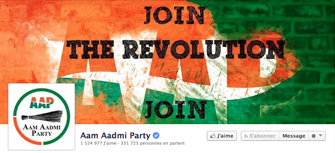 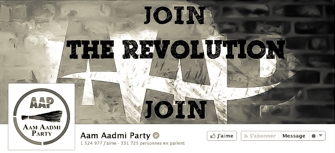 AAP’s Facebook page has been liked The AAP movement has been able to surpass the right wing, the original armchair evangelists, in the use of online and social media. Online communities have been the most enthusiastic propagators of brand Kejriwal. However, the discourse in that nebulous world is, more often than not, bare-knuckled. The safety of distance and the courage, stemming out of the structural relative anonymity offered by the Web, make these interactions anything but ethical. It is primordial, satiating one’s baser instincts and loyalties. One cannot expect finer intuitions like ethics to play, out there.
This does not mean that movements like AAP do not make mistakes. The racist undertones of the campaign against sleaze and drugs in a middleclass Delhi neighbourhood cannot be condoned. But that is hardly a reflection on the ethics of the party as a whole. It is just one of the movement’s lieutenants gone berserk. The movement should have the sagacity to rein in such elements. We have to be tolerant of this fledgling movement and walk with it, as the nascent party grows up. As a nation, do we have any other options to fall back on? Can we afford to lose this opportunity for meaningful change? Have we lately seen such idealism, in the country? Aren’t we fed up of the cynical and manufactured reactions of the established political class — their never-ending polemics in public, their ceaseless opposition and daily disruptions in the Parliament, all but surprising? Haven’t we also become numb and impotent to national issues – for example, when we see the true colors of our leaders through a sting operation? Or the ephemeral surge of righteous indignation, and the wave of pavlovian patriotism that is expressed when we learn of the barbarism of the enemy on the border? Arvind Kejriwal’s 26th of January speech Here, we have a first time Chief Minister going and sleeping on the street within weeks of his ascension to the “gaddi”. We have to foster such movements, causes and personalities, as they are honest even when ungainly and unfashionable, or when they refuse to fight the trendy, seemingly ethical battles. Let them be, and let us celebrate their refreshing honesty and conviction. The need of the hour is honesty of purpose and integrity in action. |
|
Raj Liberhan is currently the Director of India Habitat Centre (IHC), Delhi. He has held a significant range of responsibilities at the senior level in government, public sector and NGO environments, for more than four decades.
|
Lekha Roy is a homemaker and early childhood educationist, in that order. She is presently living in Kochi with her family. Deeply interested in contemporary issues, she expresses her convictions on a variety of platforms.
|
Disclaimers: The opinions expressed by the writers are their own. They do not represent their institutions’ view.
LILA Inter-actions will not be responsible for the views presented.
The images and the videos used are only intended to provide multiple perspectives on the fields under discussion.
Images courtesy: Mirk Ilic | EP Unny for The Indian Express | Samuel Buchoul | Indian Muslim Observer | Javier Alcade | Hakeem Irfan for DNA | Himachal Watcher | Public Domain of India | Facebook
Video courtesy: Piyush Mani
Share this debate… |
… follow LILA… |
||||

 The socio-political discourse in our country is increasingly being dominated by partisan perspectives. We have the Khap panchayats imposing a social code of conduct on boys and girls vis-a-vis their matrimonial choices, Vice-Chancellors forcing dress codes on women students, selective governance intended to benefit only party loyalists. This week, AAP leader and Delhi CM Arvind Kejriwal took even his large following by surprise with his undaunted ‘anarchist’ act. There is also an emerging youth in this country, seeking to dismantle the restraints on their way of life and determined to be heard. And all these make a particularly complex and vulnerable public space.
The socio-political discourse in our country is increasingly being dominated by partisan perspectives. We have the Khap panchayats imposing a social code of conduct on boys and girls vis-a-vis their matrimonial choices, Vice-Chancellors forcing dress codes on women students, selective governance intended to benefit only party loyalists. This week, AAP leader and Delhi CM Arvind Kejriwal took even his large following by surprise with his undaunted ‘anarchist’ act. There is also an emerging youth in this country, seeking to dismantle the restraints on their way of life and determined to be heard. And all these make a particularly complex and vulnerable public space.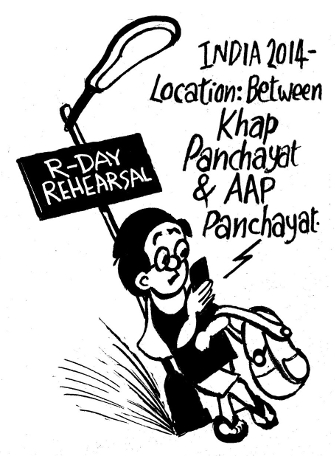
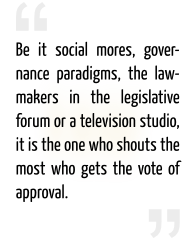
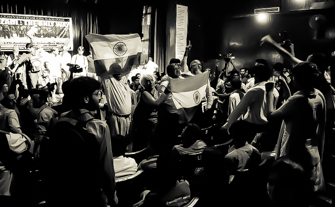

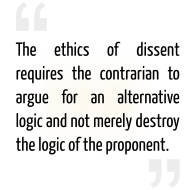
 Dissent is not a drawing room conversation—which goes well with an after dinner dessert. It is often born out of terrible injustices. Dissent cannot be good looking, because the issues are not. For the vocal middle class, idealism and principles are a matter of convenience and a feel-good factor. After all, the money has been made and the offspring sent to the best university abroad. The ‘lift-and-drop’ mode of our reception of the Aam Aadmi Party is a case in point, and it calls for urgent introspection. Arvind Kejriwal was the darling of the chattering classes as long as he espoused “our kind of causes”. His brutally honest convictions made him step out of the comfort zone of our liberal, upper middleclass concerns. He has inconvenienced our daily life. And he has been made an anti-hero, if not a villain.
Dissent is not a drawing room conversation—which goes well with an after dinner dessert. It is often born out of terrible injustices. Dissent cannot be good looking, because the issues are not. For the vocal middle class, idealism and principles are a matter of convenience and a feel-good factor. After all, the money has been made and the offspring sent to the best university abroad. The ‘lift-and-drop’ mode of our reception of the Aam Aadmi Party is a case in point, and it calls for urgent introspection. Arvind Kejriwal was the darling of the chattering classes as long as he espoused “our kind of causes”. His brutally honest convictions made him step out of the comfort zone of our liberal, upper middleclass concerns. He has inconvenienced our daily life. And he has been made an anti-hero, if not a villain.